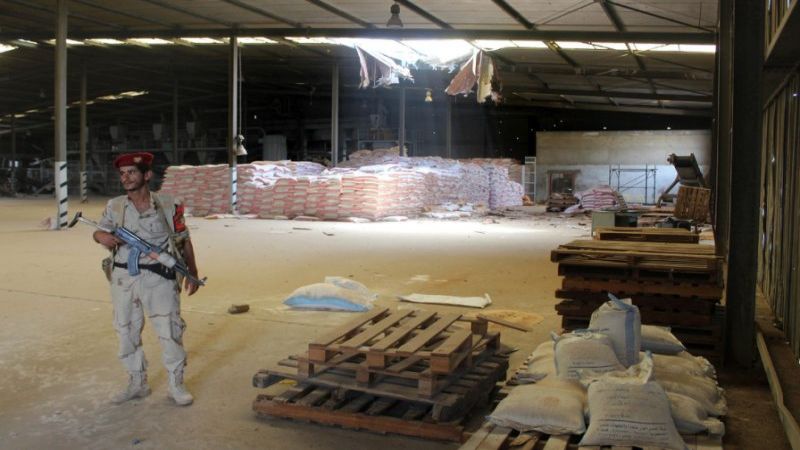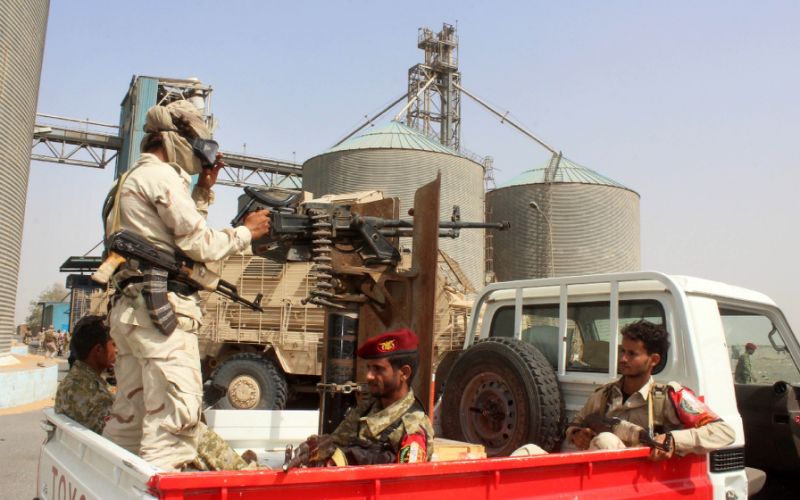
Local Editor
Gunshots reverberate through a battle-scarred granary in the port city of Hodeida, where a mountain of grain meant for starving Yemenis remains inaccessible as a hard-won ceasefire comes under strain.
The Red Sea Mills, one of the last positions seized by Saudi and Emirati-backed forces before last month's UN-brokered truce, holds wheat that could feed nearly four million people for a month in a country on the brink of famine.
But the facility, a shrapnel-pocked symbol of how controlling food is a weapon in Yemen's war, has remained off-limits to aid organizations since September as skirmishes shake the fragile ceasefire agreed with Houthi revolutionaries during talks in Sweden.
Last week, during a military embed organized by the Saudi-led coalition, AFP saw regime loyalists including Sudanese soldiers scouring the vast complex with metal.

Sudan is a member of the Saudi-led coalition.
Just after the tour, the UN on Friday reported apparent mortar shelling at the mill had started a fire that left two food silos damaged.
"The loss of this wheat comes at a terrible time," said the UN's humanitarian coordinator Lise Grande. "More than 20 million Yemenis, nearly 70 percent of the entire population, are hungry."
In Hodeida, the entry point for more than two-thirds of Yemen's food imports and international aid, the choices are stark -- either an imperfect truce with violations on both sides or all-out fighting that could unleash famine.
The ceasefire came after Western nations pressed Saudi Arabia to end its four-year military campaign in Yemen after journalist Jamal Khashoggi's murder intensified international scrutiny.
But with recurring breaches, observers warn that its collapse could be just a matter of time.
"If it is allowed to break down, there will be no opportunity for a similar deal for a long time," the International Crisis Group said.
Inside Hodeida, a city rippling with tension as the war-wounded continue to trickle into hospitals, a common refrain among civilians and military officials is "mafi hudna" —- Arabic for "no truce".
UN chief Antonio Guterres said on January 7 that neither side had tried to gain new territory since the ceasefire.
But an agreed redeployment of rival forces from the city, a key confidence-building measure, has not happened as distrust runs high.
Guterres pointed to allegations from the Houthis that pro-Hadi forces are massing troops near the city.
Pro-Hadi troops insisted to AFP that military action was the only solution even if it results in bloodshed.
But the truce has given the World Food Program "some breathing room" to reach districts in southern Hodeida that were previously inaccessible due to fighting, its country director Stephen Anderson told AFP.
However, 51,000 metric tons of wheat -- one quarter of WFP's flour-milling capacity in Yemen -- remains locked away in the Red Sea Mills.
"I am still cautiously optimistic," WFP chief David Beasley said in an interview in Davos.
The lack of access to the mill, one of the most hotly contested sites in Hodeida, is a collective punishment for starving Yemenis.
When the Houthis controlled the mill, the coalition destroyed food with indiscriminate air strikes.
"The Red Sea Mills is a leverage point being used in the most Machiavellian ways by all warring parties to achieve political goals," said Wesam Qaid, executive director of Yemeni development organization SMEPS.
"Whoever controls such facilities will have greater say on who gets fed. Food is a weapon."
Source: News Agencies, Edited by Website Team